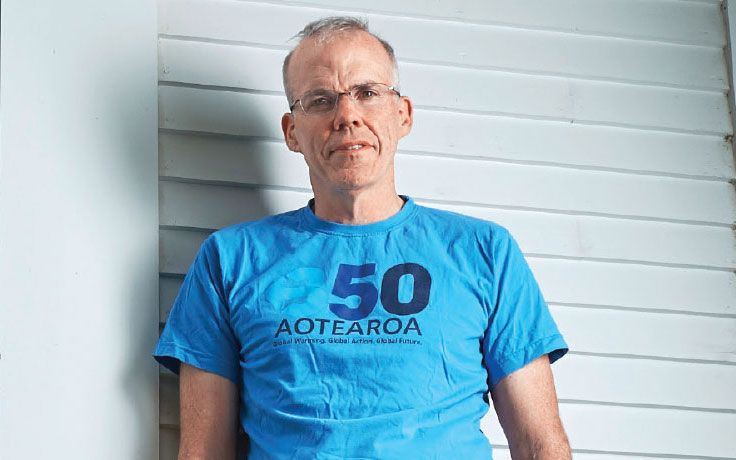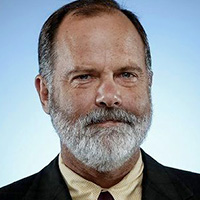BILL MCKIBBEN WAS A YOUNG CONTRIBUTOR for The New Yorker in 1989, when he published The End of Nature. The planet, he warned, was warming, as human activity infected every aspect of natural life, altering the very chemistry of the atmosphere. The response to McKibben’s book was mixed: admiration for the work, uncertainty about its implications. It is hard to contemplate the end of things.
Thirty years later, the end of nature has arrived. Climate change and its effects — sea-level rise, wildfire, drought, violent storms, famine, desperate migration — are the defining issues of our time. What once were warnings from McKibben now are, as he says, “bulletins from the front lines.” They are documented with trademark care and precision in his latest work, Falter: Has the Human Game Begun to Play Itself Out?
In a recent interview, McKibben and Blueprint editor-in-chief Jim Newton discussed McKibben’s work and the continuing war on science waged by the fossil fuel industry. One note: Blueprint interviews usually take place in person. This one was conducted via Skype; it required no plane travel and was better for the environment.
The McKibben-Newton conversation
Blueprint: I wonder if we could start by asking you to talk a bit about Falter and The End of Nature and what has happened in the 30 years between these two books. Is it cause for hope or despair, or some combination of the two?
Bill McKibben: Sure. That’s a good question. It’s very much on my mind. When I wrote The End of Nature 30 years ago, it was in the nature of a warning: “Here are the things that science tells us will happen if we do not quickly change our ways.” And we didn’t quickly change our ways. A good part of this book Falter is an effort to say: “OK, these are no longer warnings. These are bulletins from the front lines as to what is happening now. And here are some more warnings about what will happen next.”
The middle part of the book is an effort to understand why we hadn’t changed our ways, what forces were responsible for that. The immediate answer to that was the duplicitous work of the fossil fuel industry. And the larger answer to that question was the rise of a kind of libertarian, markets-solve-all-problems, laissez-faire ideology. It allowed villains like the fossil fuel industry to do what they were doing. …[In analyzing the reasons for why we failed to take action] the rise of the laissez-faire, libertarian, market über alles idea is a major part of that.
And then I try to talk about what we still might do to extract ourselves from at least some of the trouble that we’re now in and talk about the building of movements around the world, which we’re happily seeing, and the remarkable technology, particularly the solar panel, which at least possibly offers some way out.
BP: I took particular note of something you wrote early in Falter. You said, “A writer doesn’t owe a reader hope, the only obligation is honesty.” But you’re also an activist. How do you balance that question of hope and honesty, and do you feel optimistic, pessimistic?
BM: I’ve thought about it a fair amount and decided I’ve given up worrying about how to define that. There are plenty of reasons to be pessimistic. The science is very dire. There are also some reasons to be hopeful, in that people are finally gathering in movements of the size and scale to make a difference.
But I don’t worry about which of those is winning. I just try to get up in the morning and do what I can to change the odds a little bit. I think all we’re doing is changing the odds without knowing what the outcome of the wager will be. But the stakes are so enormously high that even changing the odds a little is the most useful work that one can be doing right now.
BP: Do you have a sense, as you look around the world and travel around the world, of where the United States is in that quest to change the odds? Is this country a leader or a laggard?
BM: Well, for the most part it’s a laggard and always has been. That’s because the fossil fuel industry is most politically powerful here. As a result, we’ve always lagged behind — at Kyoto, at Copenhagen, at every juncture. There were some signs that we were beginning to catch up a little as we got to the Paris accords and took a reasonable role in the proceedings. But then, of course, the advent of the Trump administration has, at the very least, been a major pothole in the road to getting something done.
BP: I’m struck by the way you deal with Trump in Falter, in that he’s simultaneously sort of a blip in this larger story of the fossil fuel industry and, of course, climate change itself, and at the same time he’s this terribly destructive or at least distracting force.
BM: He came in at precisely the wrong moment, just as we were beginning to acquire a bit of momentum. I think he represents the last gasp of that way of thinking. When he goes, climate denialism will go with him. But, it must be said: These were four years we could not afford to have wasted, and if it turns into eight years, it will be an even more depressing disaster.
BP: There’s a part of me that wonders whether even he believes what he says on climate change.
BM: I doubt it. In the recent past, he’s taken the opposite position. I think he says and believes what he thinks is convenient and opportune for him at the moment. We’ve probably never had a character in American political life who thought more about themselves and so little about the country and the world.
BP: Are there other parts of the world in which climate denialism is a force with which to contend?
BM: A little bit. You see some of it in Canada and some of it in Australia and a little bit in England. I think that has a lot to do with the fact that these are all English-speaking nations, and I think it actually has a lot to do with the fact that Rupert Murdoch is powerful in all of them. He’s probably been the single most destructive force in terms of spreading misinformation about climate change. …
BP: You note in Falter that there was a moment where it seemed like Murdoch might go the other way…
BM: Yes, he had a brief flirtation with the idea in the Al Gore, Inconvenient Truth era, but it seems to have been a passing fancy that quickly faded.
BP: You mention Al Gore and his film, “An Inconvenient Truth.” How has the question of climate change become ideologically divisive? Why, on a base level, should this issue — protecting the environment, preserving things as they are — be divisive?
BM: It became ideologically divisive because the fossil fuel industry decided to fight as hard as it could to keep us from doing anything about it, and the vehicle that they chose was the Republican Party, which they more or less purchased, the Koch brothers being the biggest purchasers and the biggest oil-and-gas barons. That’s what happened. The history is pretty clear, but it is nonetheless astonishing.
BP: And why is it that the oil and gas industry is so relatively powerful in the United States versus, say, Germany or France or Britain?
BM: It’s powerful in all those places, but the Europeans tend each to have one big oil company, Total in France, BP in Britain, Shell in the low countries, whereas in the U.S. it’s always been a dominant industry since the days of John D. Rockefeller. [It’s] the thing our prosperity was most built upon, the thing that we’re more addicted to than anyplace in the world. So, it was particularly powerful here.
BP: And there was a crucible moment for that industry, as you write about. There was a moment, now documented, that Exxon recognized the existence and implications of climate change and could have acted differently but chose not to.
BM: Yes, absolutely. Had Exxon merely said, the same day that Jim Hansen made his announcements to Congress in 1988 [Hansen, a NASA scientist and head of the Goddard Institute for Space Studies, testified before the Senate Committee on Energy and Natural Resources on June 23, 1988, that “the greenhouse effect has been detected and it is changing our climate now.” That testimony marks a seminal moment in the recognition of climate change], that our scientists are finding the same thing, then we would doubtless have gone to work on it as a society. Instead, they started investing, with their peers, billions of dollars in this architecture of deceit and denial and disinformation.
People say: Why didn’t Exxon just become a solar panel company?
BP: Right. That could have been a business plan for them, right?
BM: The answer is: A) these companies think in the short term, and B) in the short term, there was so much more money to be made in the oil industry. In the last 25 years, Exxon has produced the five most profitable years of any company in any industry in any country in the history of money.
The fundamental problem is, if you’re Exxon, for 100 years you’ve prospered by charging people, making them write you a check every month, for a delivery of oil. For Exxon, the idea that the sun simply comes up each morning and delivers power for free to your rooftop is as horrible a business plan as you could come up with.
BP: In both of these books, you discuss the ozone layer, and in many respects that’s a success story, of humanity rallying around an issue that no single country or jurisdiction could solve, and yet there’s been progress. Nuclear weapons have spread — and we could argue over whether that’s been a success or not — but at least they haven’t been used again in anger since Japan. Should those experiences give us cause for hope?
BM: They should give us measured cause for hope. They demonstrate that we’re capable of rising to the occasion.
The reason that it’s only a measured cause for hope, though, is that no one was ever going to get rich blowing up nuclear weapons. They could make money making them, and surely the defense-industrial complex has done that. But you didn’t really need to blow them up.
And nobody made that much money off fluorocarbons. The same companies that were making them quickly discovered substitutes that produced as much cash. And that’s why it was relatively easy to deal with them.
So [those examples are] good signs of human beings rising to the occasion, but they’re not like fossil fuels.
BP: You present almost a unified theory of these problems that stretches from Citizens United all the way to climate change. I wonder if that’s liberating, in that it presents a coherent and comprehensive view, or whether it’s daunting to face the enormity of this crisis and its causes and implications.
BM: It allows one to try to figure out where to intervene effectively.
BP: And where is that?
BM: It is this set of insights that allowed us to start going after the fossil fuel industry infrastructure with the Keystone pipeline and allowed people to start this vast fossil fuel divestment movement, which has begun to take its toll. Understanding what you’re up against is the first requisite for doing something about it.
BP: How do you crystallize the urgency of this moment? How much do the next four, five, 10 years matter in terms of confronting climate change?
BM: The scientists have given us fairly straightforward deadlines. If we haven’t made fundamental transformation by 2030, then we can’t have any hope of meeting the targets we set in Paris. And, of course, if we were going to be making fundamental transformations by 2030, our political systems would have to be gearing up right now. So the next four or five years are, I think, probably the last really good chance we’re going to get, not at stopping global warming — too late for that — but stopping it short of the place where it cuts off civilization at the knees. It’s very urgent right now.
BP: What can or should everyday people do about that?
BM: The most important thing individuals can do is not be so much of an individual. It’s very important, very good to be thinking about your own, everyday life. My house is covered with solar panels. I drove one of the first electric Fords in the state of Vermont.
But I don’t try to fool myself that this is how we’re going to stop climate change. You can’t make the math square one Prius at a time anymore.
So we need people to be a little less individual and join together in those movements large enough to change the basic economic and political ground rules, changes with enough leverage that they might actually have some effect on the concentration of carbon in the atmosphere.
BP: Are there models, either in the United States or around the world , of jurisdictions — states, cities, provinces, countries — that, in your view, have squarely addressed this issue and are models for others to follow?
BM: Yes, there are some that have started to, anyway. There’s a scattering of countries that for one reason or another have access to very good renewable resources and have done remarkable things to exploit them — Norway, Costa Rica, some others.
And there are jurisdictions — California and New York, for instance — that have put really far-seeing plans into effect and are beginning to see big shifts. Germany, in much the same way. And those have tended to drive the development and the reduction in cost of renewable energy. You’re seeing the largest-scale implementations of that now in China and India, where people are employing these technologies at rates we hadn’t imagined.
BP: Is there room for others to simply emulate that course?
BM: Well, look at the things that California has done. I think California will be pretty close to a sustainable place at some point. Not in time, I’m afraid, to save its beaches and forests and so on — [California] is very vulnerable to climate change — but it’s certainly showing us what can be done.
BP: Let’s move for a moment to the genetic engineering aspect of your work. It’s hard, I suspect, for many people to imagine saying “no” or drastically curbing a technology that obviously has the prospect of doing so much good. It’s hard to say to a person: We’re not going to cure your dementia or your Parkinson’s because of the long-term implications. …
BM: As I point out in the book, that’s not what one needs to say. The only thing one needs to say is that we will draw the line at the germline, at heritable genetic modification. I don’t know anyone who’s against somatic genetic modification. If people are suffering from problems, then this is a normal and natural extension of medicine. What isn’t normal and natural is to decide you’re going to design your children.
BP: There’s already been some leakage around that line. Is it containable at this point?
BM: The Chinese last autumn produced the first two designer babies. And it seemed to have given at least a little pause to some of the genetic science establishment in the rest of the world. [In the aftermath of that announcement], there have been pretty broad calls for a moratorium on this kind of work.
BP: And if there is a moratorium, could it hold? I mean, to return to the example of nuclear weapons: There has long been a determination to contain them, and it has sort of held, in the sense that they haven’t been used again, but they’ve also spread from country to country. Is it possible to keep the genie [of heritable genetic modification] in the bottle?
BM: I don’t know. I think it’s possible. For this to become an industry, which would be the great fear, society would have to cooperate. No one’s going to do it without insurance and all the other leverage points in a regulated society. That’s why the tech barons hate regulation. They’re Randians, too.
BP: Near the end of The End of Nature, you write about your neighbor, whom you call Jim Franklin, who’s skeptical about the causes of acid rain. He thinks it might be the result of too many trees. That was a long time ago, but … does he still believe that?
BM: I don’t know. I think that in general, we’ve lost as these questions have become more and more ideological and partisan and polarized. But I also think they’re at the point now where almost no one really disbelieves what’s happening, especially people who live in rural areas and are much more exposed to the operation of the planet than people who live in the suburbs.
Watching the warming of the Earth, most people at some level have cottoned to what’s going on, even if it’s politically difficult for them to say it, even to themselves.

























